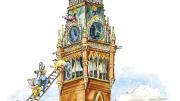1920
The Faculty of Arts and Sciences accepts recommendations from the Committee on Admission that make it easier to admit well-qualified public high-school boys who might have been barred “by…merely technical defects of school and examination records.”
1935
Signs of spring: “Parties unknown” remove the clapper of the Memorial Hall bell in broad daylight, using hacksaws and other tools.
1940
At the first Senior-Alumni Dinner, sponsored by the Alumni Association, Mayor Fiorello La Guardia of New York urges seniors to go into government and “be unorthodox.” Said the guest of honor, “I didn’t last five minutes in any party. Going into government doesn’t mean going into politics. The country can’t stand government by politicians. We need specialists.”
1960
President Pusey appoints lecturer in government Daniel S. Cheever ’39 his special research assistant to investigate the impact on Harvard of federal funding, which represented 1.5 percent of the University’s budget in 1941 but nearly 20 percent in 1959.
1975
In his fourth annual report, President Derek Bok implores the University’s professional schools to train public leaders prepared for post-Watergate America. Bok writes, “In the wake of grave public scandals, followed by severe recession and unemployment…it is timely to consider what universities can contribute to improve the level of public service, and specifically what Harvard can do to prepare students for public careers.”
1980
Plans are afoot for the men’s varsity basketball team to travel to China in June for a five-game goodwill tour.
1990
Monty Python’s John Cleese, in town to accept the Harvard Lampoon’s Elmer Award “for lasting contribution to comedy,” draws a full house in the Science Center. Asked to contrast British and American humor, he replies, “[T]he most obvious difference, of course, is the way they’re spelled.”
2000
As of January 1, 2001, Drew Faust will become “founding dean” of the new Radcliffe Institute.









